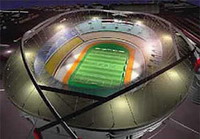Joao Havelange stadium gets praise from Pan American Games organizers
Brazil's newest and most modern Joao Havelange stadium earned praise from Pan American Games organizers despite some minor infrastructure problems.

The stadium, which will host soccer matches and track and field in the June 13-29 Pan Ams, officially opened in Rio de Janeiro on Saturday with Botafogo beating Fluminense 2-1 in a Brazilian league match.
"The stadium earned a gold medal," Brazilian Olympic president Carlos Arthur Nuzman said. "It's a symbol of the games and a gift for fans in Rio and Brazil."
Built to higher standards than nearly all other Brazilian stadiums, the Joao Havelange is the premier venue constructed for the hemisphere-wide competition later this month.
"It's the top venue for the Pan American Games, the one which demanded the greatest investment," Brazil sports minister Orlando Silva said.
The stadium - which reportedly cost nearly 400 million reals (US$207 million; 153 million EUR) - is not glitch-free, however.
Fans had to deal with extremely busy traffic near the stadium, and huge lines inside at the few concession stands. Some fans had to wait nearly one hour to get a hot dog, local media said.
"It's all very beautiful, but there are a lot of things that need to improve," retiree Jose Sarney told the UOL Web site.
Nearly 45,000 fans packed the stadium. The soccer final will be played at the renovated Maracana stadium.
"The Joao Havelange stadium gives Rio an international element that the city didn't have," Rio de Janeiro mayor Cesar Maia said.
The stadium was named after the Brazilian who headed FIFA for two decades and helped soccer become the world's most popular sport. Havelange, 91, also is a longtime member of the International Olympic Committee.
Also Saturday, the Maracanazinho arena was reopened after years of renovations ahead of the games. Brazil's women's volleyball team beat Serbia 3-1 in a friendly before about 10,000 people.
The 12,500-capacity indoor gymnasium next to Maracana stadium has a new court and improved lighting and sound systems.
The Olympic-style Pan Am Games are seen as a huge test for Brazil to prove it is capable of hosting major international sporting events, including the 2014 World Cup and the 2016 Olympics.
Subscribe to Pravda.Ru Telegram channel, Facebook, RSS!




